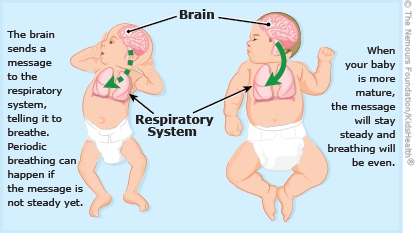Periodic Breathing: How to Care for Your Baby
Periodic breathing can be scary, but it usually does not have a serious cause or lead to problems.


Periodic breathing is common in newborns, especially premature babies. It happens most often during sleep. During periodic breathing a baby has a pause in breathing that lasts about 5–10 seconds, then has several rapid and shallow breaths. This pattern may repeat several times. Then the baby returns to regular breathing on his or her own. Some babies have a slight decrease in their oxygen level or heart rate during this type of breathing, but these drops return to normal on their own without any help from parents, nurses, or health care providers and are not harmful to the baby.
This is different from apnea, which is a pause in breathing for a longer period of time (more than 20 seconds) without the pattern of fast breathing after the pauses. A baby with periodic breathing is comfortable, does not appear scared, and is not struggling or gasping to breathe.
Periodic breathing is a normal breathing pattern in healthy infants. It does not usually have a serious cause. Your health care provider has done a thorough exam and ruled out any dangerous conditions.
Although it can be frightening, periodic breathing typically causes no other problems in newborns. As a baby matures, episodes of periodic breathing become less frequent and usually go away completely by 5 to 10 months of age.

-
Periodic breathing does not need special care at home.
-
Continue to use safe sleep practices:
-
Always place your baby on his or her back to sleep for naps and bedtime.
-
Don't put your baby to sleep with pillows or on soft surfaces.
-
Keep the crib or bassinet in the room where you sleep until your baby is about 1 year old. Don't have your baby sleep in bed with you.
-
Do not shake your baby to stimulate breathing; this can cause injury.

-
Episodes of periodic breathing become more frequent or last longer.
-
Your baby has new symptoms such as fever, cough, or poor feeding.
-
You have any questions or concerns.

-
Your baby has a blue, gray, or pale color of the mouth or fingernails.
-
Pauses in your baby's breathing last longer than 15 seconds.